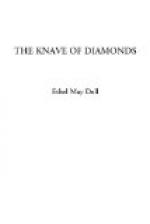He was standing close to her, and again fear stabbed her—fear that was almost abhorrence. There was something about him that was horribly suggestive of a menacing animal.
“I am in earnest,” she said again. But she could not meet his eyes any longer. She dared not let him read her soul just then.
“I am in earnest too,” said Nap. “But you needn’t be afraid of me on that account. I may be a savage, but I’m not despicable. If I take more than you are prepared to offer it’s only because I know it to be my own.” He bent towards her, trying to see her face. “My own, Anne!” he said again very softly. “My own!”
But at his movement she drew back sharply, with a gesture of such instinctive, such involuntary recoil, that in an instant she knew that she had betrayed that which she had sought to hide.
He stiffened as if at a blow, and she saw his hands clench. In the silence that followed she stood waiting for the storm to burst, waiting for his savagery to tear asunder all restraining bonds and leap forth in devilish fury. But—by what means she knew not—he held it back.
“So,” he said at last, his voice very low, “the Queen has no further use for her jester!”
Her heart smote her. What had she done? She felt as if she had cruelly wounded a friend. But because he demanded of her more than friendship, she dared not attempt to allay the hurt. She stood silent.
“Can’t you find another role for me?” he said. “You will find it difficult to exclude me altogether from the cast.”
Something in his tone pierced her, compelled her. She glanced up swiftly, met his eyes, and was suddenly caught, as it were, in fiery chains, so that she could not look away. And there before her the gates of hell opened, and she saw a man’s soul in torment. She saw the flames mount higher and higher, scorching and shrivelling and destroying, till at last she could bear the sight no longer. She covered her face with her hands and blotted it out.
“Oh, Nap,” she moaned, “if you love me—if you love me—”
“If I love you—” he said.
He put his hand on her shoulder and she trembled from head to foot.
“Prove your love!” she whispered, her face still hidden.
He stood awhile motionless, still with his hand upon her. But at last it fell away.
“You doubt my love then?” he said, and his voice sounded strange to her, almost cold. “You think my love is unworthy of you? You have—lost faith in me?”
She was silent.
“Is it so?” he persisted. “Tell me the truth. I may as well know it. You think—because I am not what Capper would, term a thoroughbred—that I am incapable of love. Isn’t that so?”
But still she did not answer him. Only, being free, she turned to the garden-seat and sank down upon it, her arms stretched along the back, her head bowed low.
He began to pace up and down like a caged animal, pausing each time he passed her, and each time moving on again as if invisibly urged. At last very suddenly he stopped with his back to her, and stood like a statue in the moonlight.




